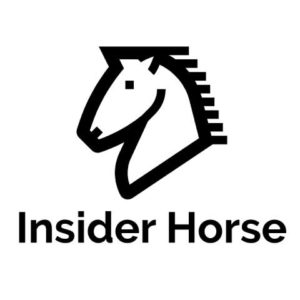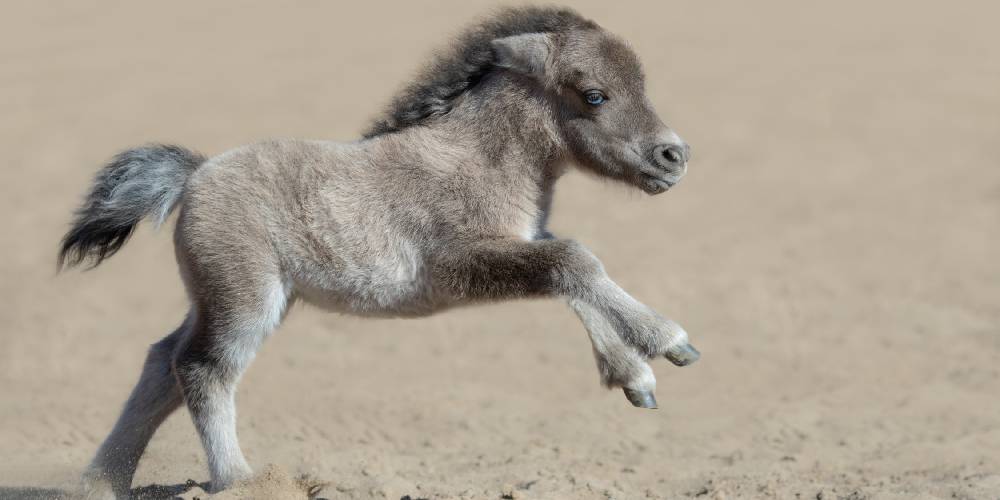Is your mare expecting? Here are 10 things you should know about foals before your mare delivers! Knowing what to expect as far as what’s normal for your foal is essential to ensure their health and happiness under your care.
A few things you might not know about foals include how much sleep they get during the day, when their first teeth will come in, if certain behaviors are normal or not, and much much more. Making sure you educate yourself on what to expect from your foal will help you feel more capable and competent when it comes to working with and caring for the latest addition to your family.
In this article I will answer the following questions:
- How much sleep do foals need per day?
- Are foals born without teeth? And if so, when do their teeth come in?
- Why is my foal eating its mother’s manure?
- When will my foal need to be weaned?
- How long after birth do foals stand?
- When will foals start to eat solid foods?
- What time of day are foals most commonly born?
- Why do foals open their mouths and ‘champ’ their teeth when smelling other horses?
- How long after birth should a foal start nursing?
- Are foals born with hard hooves?
How Much Sleep do Foals Need Per Day?
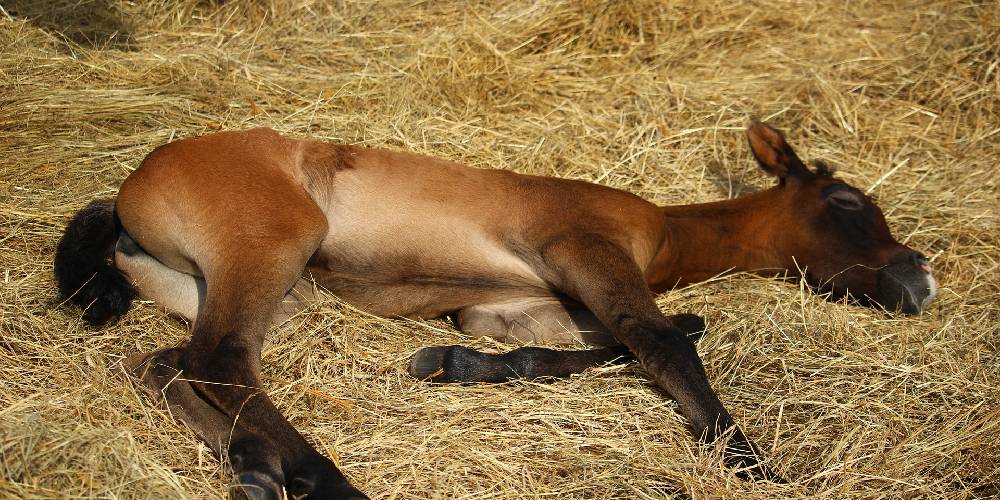
Foals, just like human babies, need lots and lots of beauty rest. But how many hours of sleep should you expect them to require per day?
When under 3 months of age, foals require around 12 hours of sleep per day! That number is 4 times what the adult horse requires for sleep each day! While 12 hours of sleep may seem like a lot, that is actually just the average number. Newborn foals will spend a good majority of their first week just sleeping and eating.
If you notice that the latest addition to your herd is sleeping a lot, don’t be alarmed! This is a perfectly normal behavior in baby horses. Sometimes after an hour or two of play, baby just needs a little power nap to recharge!
After the 3 month mark, foals will begin to sleep less and less as they get older. They may also start to stand up to sleep more often instead of lying down to rest every time.
Are Foals Born Without Teeth? And if so, When do Their Teeth Come In?
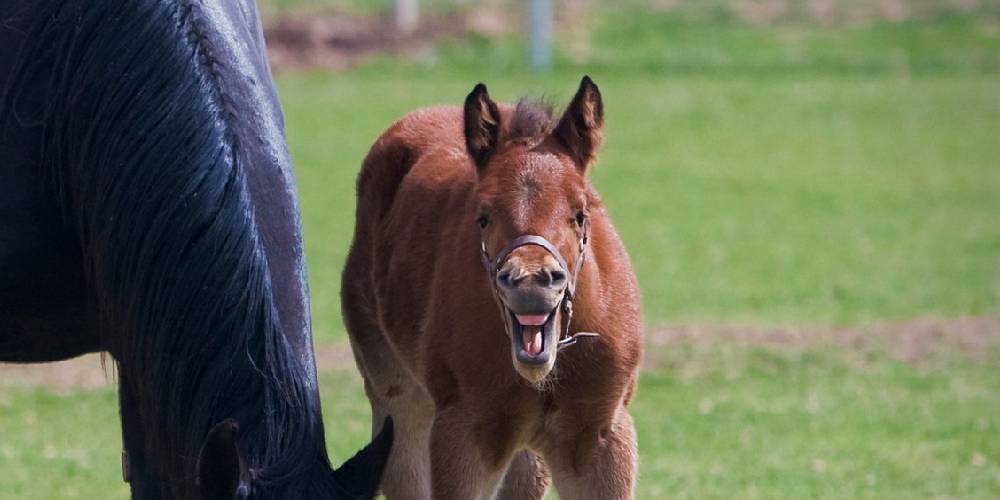
Believe it or not, baby horses are most commonly born without teeth! Though this tooth-free phase only lasts for a short time, it might be funny looking to see your new foal’s toothless grin.
Foals get their first set of teeth in at around one week of age. Their first set of teeth are known as milk teeth. They will only have two big teeth on top and two more on bottom. Compared to the teeth of a mature horse, baby teeth are so funny to look at. They are just too cute!
This first set of teeth will quickly be replaced at 6 to 8 weeks of age by their next set of teeth.
If your foal is born with teeth, don’t worry! Though uncommon, it is not unheard of for a foal to be born with a couple of their first teeth already showing through.
Why is my Foal Eating its Mother’s Manure?
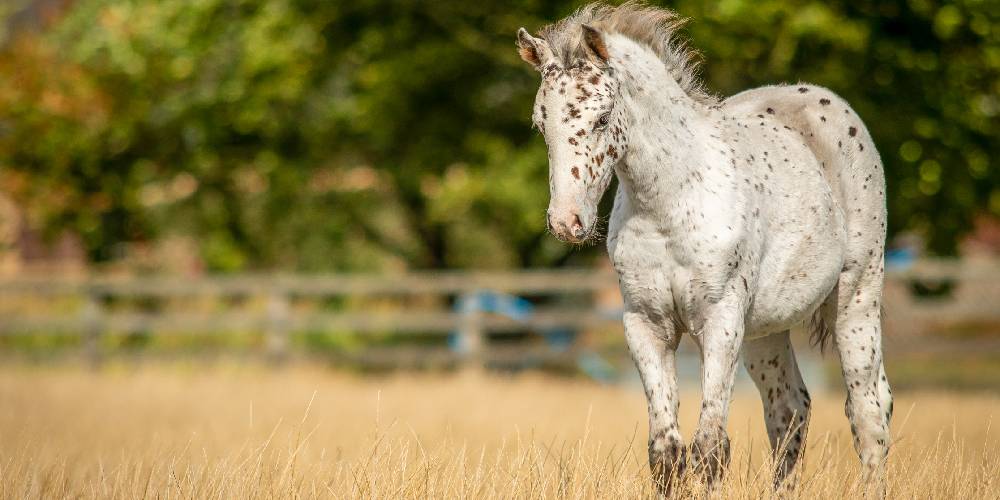
I know this may seem alarming, but it is actually pretty normal for a foal to eat its mothers manure! There are a few different reasons why foals do this:
- One reason as to why they will eat manure is to kickstart their immune systems. Manure often contains parasites and eggs which if ingested will require the foal’s immune system to kick into overdrive to keep baby healthy. Think of this sort of like natural vaccination!
- Another reason as to why foals will eat manure is to help get their gastrointestinal tract working properly. Eating manure can help to populate the GI tract with good digestive bacterias which will aid in digesting foods later!
While eating manure is a completely normal behavior in foals, if you observe this with mature horses, you should immediately note it as a red flag and consult with your veterinarian.
When Will My Foal Need to be Weaned?
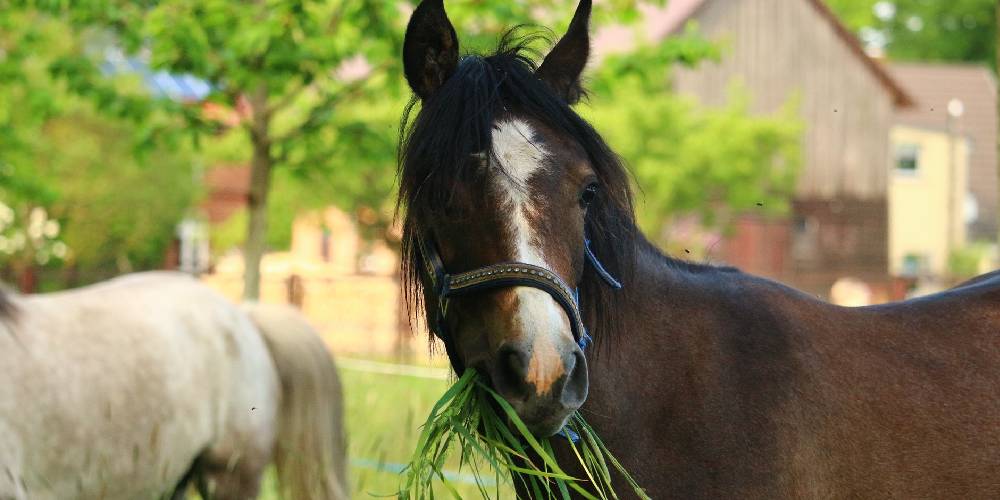
I know weaning may seem mean or sad to a number of people, eventually it needs to be done! Baby can’t stay with Mama forever, and their comes a time where the foal will need to be weaned.
Weaning is typically done between 4 and 6 months of age depending on the health of the foal and how dependant or independant they are.
Some reasons and/or signs that you should consider weaning your foal are:
- The mare has bad vices that you don’t want baby to learn
Sometimes mares have bad habits that they can pass down to their baby at a young age. If your mare paces, paws, cribs, weaves, wood chews, or displays any other bad habits or vices, weaning your foal before they learn these behaviors may be a good idea.
- The foal is eating mostly solid foods and no longer needs to nurse
If your foal has pretty much stopped nursing and relies almost entirely on solid foods, the chances that the baby still needs to stay with their mama aren’t very high.
- The foal is strong, healthy, and independant
If a foal is showing confidence in being independant and no longer really needs to stay close by their mama for security and protection, it can be a sign that they no longer will need their mother’s support.
- The mare is starting to become irritated and push her foal away
Sometimes, a mare will initiate the weaning process. If her baby is starting to irritate her and she no longer is nursing her foal willingly, it sometimes is best to separate them for the safety of the foal.
How Long After Birth do Foals Stand?
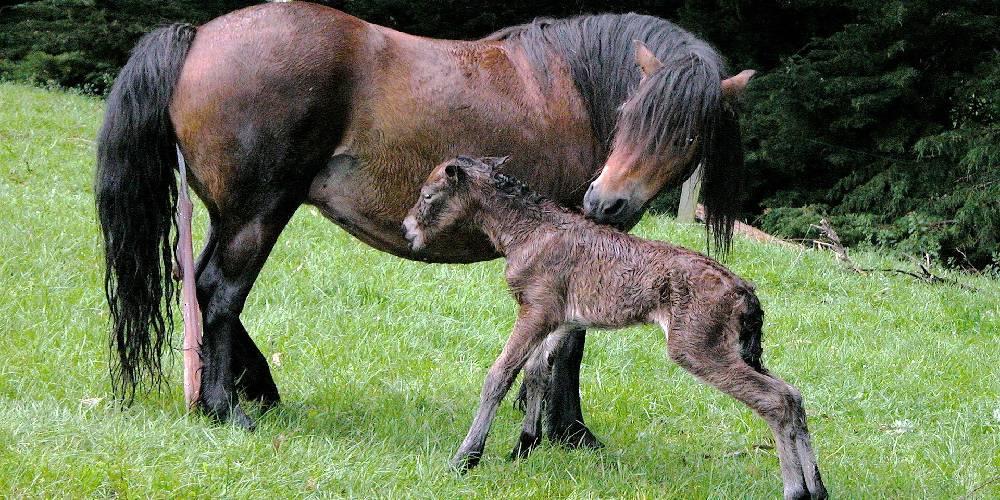
Foals should be standing within one hour of birth.
Because horses are prey animals, the ability to stand up and move around within the first hour of birth has been an essential part of their ability to survive for thousands of years.
If you notice your foal is having trouble standing or if they haven’t been able to get up off the ground well past the one hour mark, contact your veterinarian immediately! If the foal hasn’t gotten up or hasn’t been able to get up, something could be seriously wrong!
When Will Foals Start to Eat Solid Foods?
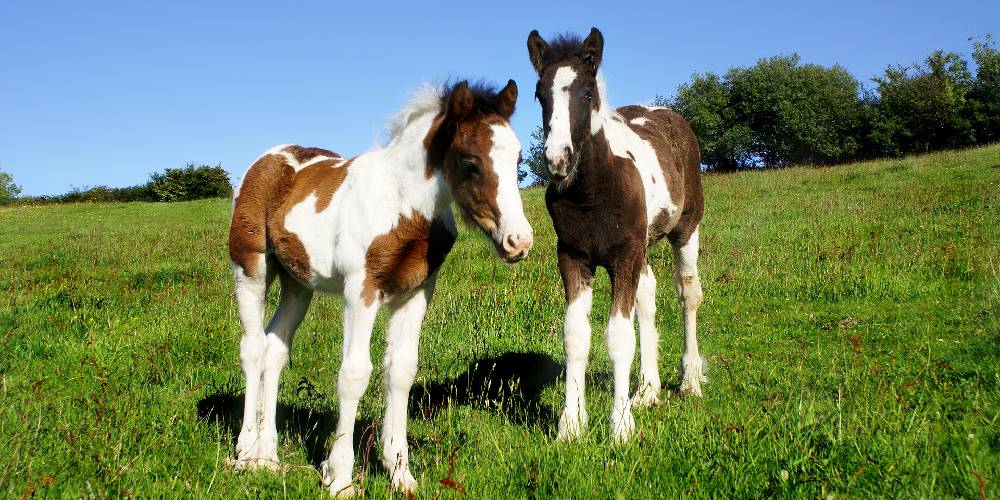
By one or two weeks of age, you may notice that your foal is starting to try to copy its mother’s eating and experiment with nibble grass or hay.
Though they may sample her food here and there, foals won’t actually begin to include hay, grain, or other solid foods into their diet until they are around 2 to 2.5 months old.
When your foal begins to eat more and more solid foods, make sure your nursing mare is still getting enough to eat! Nursing takes quite the toll on a mare and she’ll require much more food than she did when she was pregnant. If her baby is not only nursing, but is also starting to share her meals, increasing their food might be a good idea.
What Time of Day are Foals Most Commonly Born?
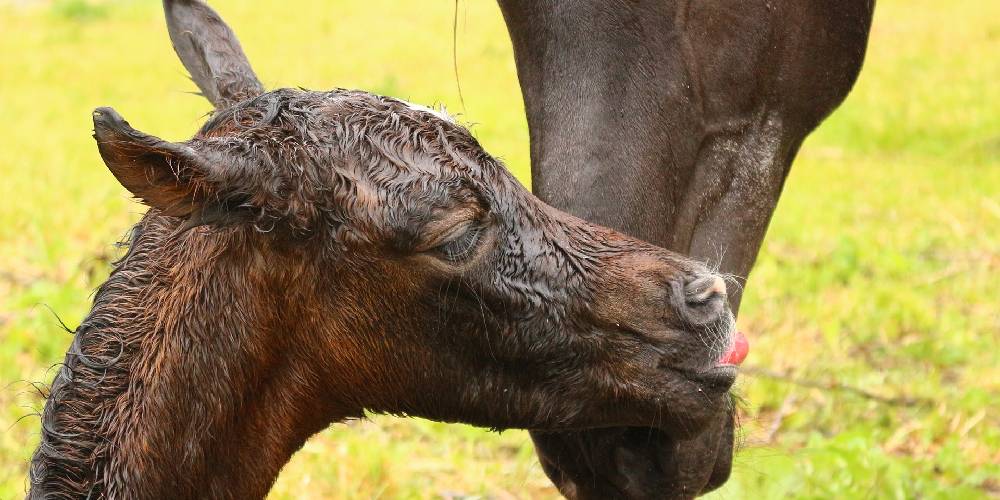
In the wild, mares typically will leave their herds for search of a quiet, safe place to have their foals. Foals are generally born at night when predators are asleep and all is quiet and peaceful.
Domesticated mares will generally follow this same pattern with 90% of foals being born at night or in the wee hours of the morning. Mares will wait until all human observers have left for the night to finally have their babies.
Because of this, unfortunately you may not get to witness the birth of the latest addition to the herd. Instead, you may go out to the barn the next morning and stumble across an adorable little surprise in your mare’s stall!
Though some mares may foal during daylight hours, don’t expect to see a baby until the sun has gone down!
Why do Foals Open their Mouths and ‘Champ’ their Teeth when Smelling Other Horses?
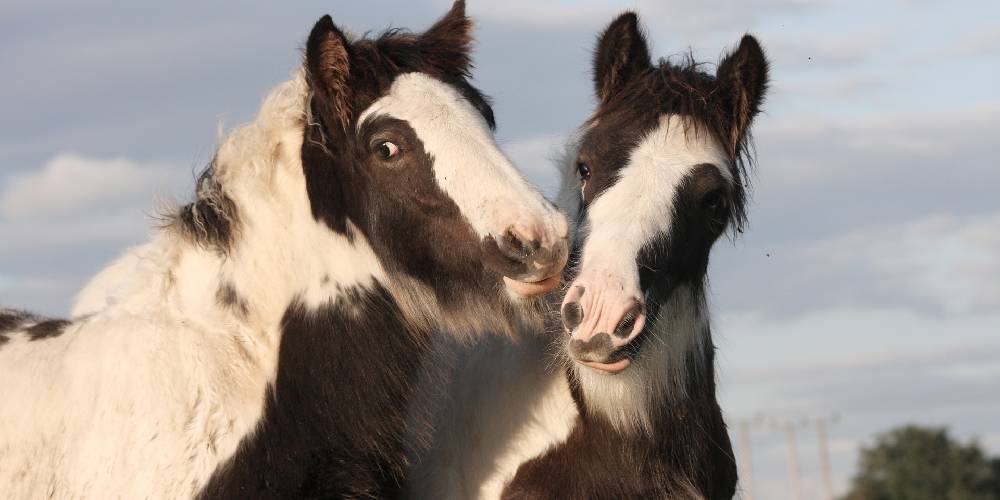
If your foal is introduced to another horse whether it be in a herd environment, or maybe just through the fence, you may notice that when another horse gets close to the baby, the baby will start to open its mouth and bite down repeatedly. This behavior is called ‘champing’ (or ‘baby talk’ in less formal words).
Foals will demonstrate this behavior when approached by a bigger horse or a horse they’re unfamiliar with. It basically means “Please don’t hurt me! I’m just a baby!”
How Long After Birth Should a Foal Start Nursing?
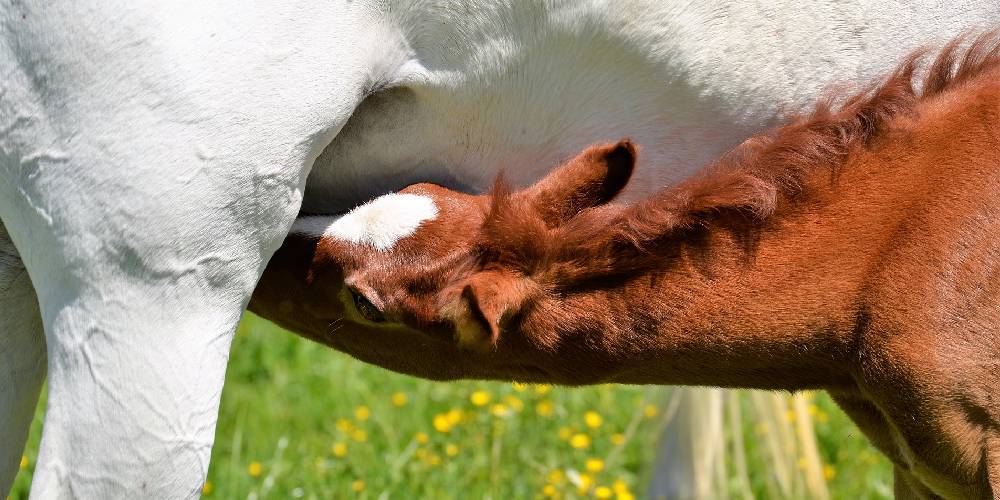
After birth, the first thing you should make sure your foal does is stand up. Assuming your foal is able to stand up just fine on its own, the next thing they should do is eat.
Foals are born with the natural instinct to suck. You may notice the foal starting to try to find something to nurse on after they get to their feet. Occasionally you may need to help guide the baby to the mare’s teats, but for the most part, foals should be able to get to the milk on their own.
A healthy foal should be standing and nursing within the first two hours of life out of the womb. If you notice your foal is not showing interest in nursing or is having trouble latching, call your vet immediately. Newborns are very fragile and if they don’t get the proper nutrients in their systems then things can go south very quickly!
Are Foals Born With Hard Hooves?
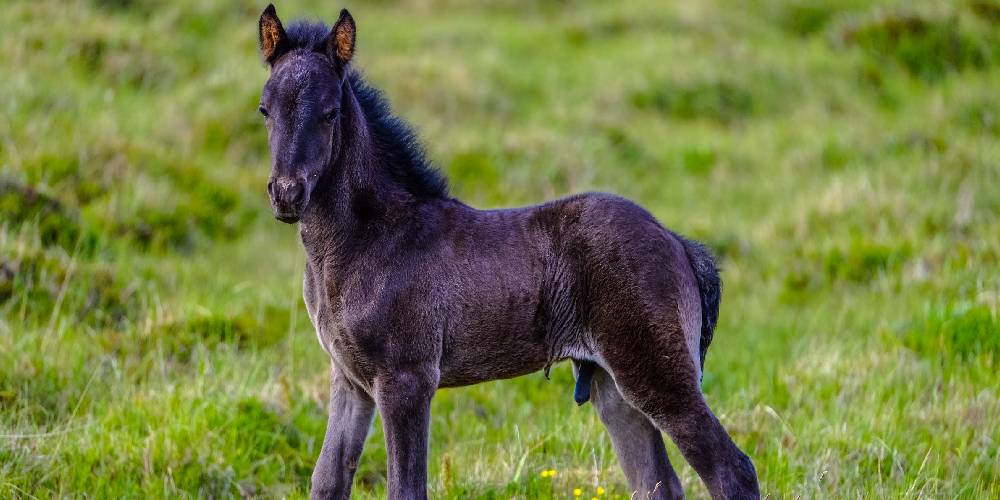
I know it might sound strange, but foals are actually born with soft hooves!
In the womb, if a foal has hard hooves, it can do a lot of damage to the mare if the baby kicks or moves at all. To protect the mare’s insides and ensure a more comfortable birth, foals are born with soft hooves that can actually bend and squish! This way any fetal movements and what not don’t cause any internal damage to the mare during pregnancy and birth.
Once their soft hooves have hit the outside world however, they will begin to dry out and before long, their hooves are hard just like their mama’s!
